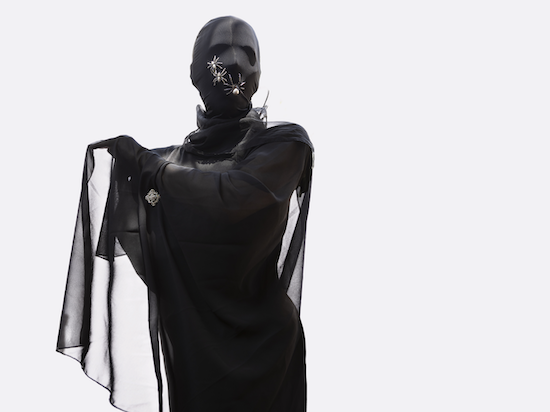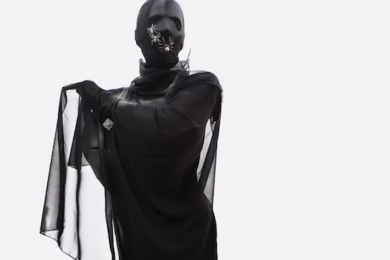Thirteen seconds into Broken Gargoyles, Diamanda Galás begins to sing. It is a note that hovers over a rough background drone, a single frequency frayed at the edges like a raven with feathers missing from its wing. It is joined by other vocal sounds, all similarly fractured, a choir of noises that sit just the right (or wrong, depending on your constitution) side of comfort. Further drones emerge. There is a crash. Two and a bit minutes later, a metallic ping. The ceremony begins.
There is simply no music like Diamanda Galás’. Nothing that I have heard has such a specific capacity to move. Encountering her infrequent live sets, I have entered a trance-like state with no chemical or alcoholic assistance, have felt my body start to shake involuntary, have burst into tears. When she performed the songs of Jacques Brel at the Barbican some years ago, she stripped away the jolly bonhomie and exposed their core – the grotesque sexuality, the broken drunks, the unedited humanity.
Even listening to twelfth album Broken Gargoyles for the first time, on headphones in the quiet of a library, placed me in a curious, heightened emotional state. A Japanese martial arts expert once told Galás that her voice deploys "kill energy." People in electronic music spend thousands of pounds on modular synths, music-editing software, monochrome tattoos and clothes by Rick Owens to try and make music that comes across as replete in coruscating dread as this. All fail. Some even go to the trouble of acquiring or channelling PhDs in cultural theory to enable them to write nonsensical press releases to justify their emotionless mithering. This is a practice (it definitely is a practice) a learned friend calls "CV inflation." Even these are doomed.
For what they neglect, and what Diamanda Galás has in every single note of the music she produces, is soul. No matter how vast the range she is able to occupy with her sui generis vocal ability, no matter how, seven-and-a-bit minutes into ‘Mutiliatus’, she is able to sound like infernal beings pouring out of a manhole cover to the third circle of hell, there is always a beautiful humanity to her music. She understands, as so few do, that to plunge the depths of human emotion is also to see the heights, to reach the transcendent, to hold in one moment death and the bloody energy of our bodies.
This is of course frequently misunderstood. When I first saw Galás play live at the Southbank Centre, someone I was with refused to believe that all of the sound came from an unmanipulated human voice alone. Onstage, she raised her eyebrow and commented that a journalist from The Wire had called her the ‘Goth Shirley Bassey’. "They are wrong," Galás said, "Shirley Bassey is a goth." When I interviewed her, around the same time, she laughed as she said, "Diva now just means any cunt with an attitude who decides to do anything."
I think it’s this essential and sublime humanity that sits within her voice that allows Galás to explore subject matter that would be beyond the grasp of most artists, for whom to explore them might appear gauche or in poor taste. In the 1980s, Galás released The Divine Punishment, Saint Of The Pit and You Must Be Certain Of The Devil, the so-called Masque Of The Red Death trilogy of albums that turned the shaming language of Leviticus into a weapon of rage to turn against the judgement of the AIDS crisis which had claimed the life of her own brother. She was also arrested for taking part in ACT-UP protests. Other subjects of her work have been the Armenian genocide, schizophrenia and the poetry of exile. On Broken Gargoyles, Galás vocalises the words of German poet Georg Heym, who in the early 20th century wrote verses about the suffering of soldiers at war. The album’s title is also inspired by the 1914 to 1918 conflict, referencing the photographs Ernst Friedrich took of the faces of soldiers brutalised by shrapnel and bullets.
With that in mind, I look up this page and feel that my lines about ravens and "infernal beings" feel trite. All manner of gothic superlatives could be deployed in reviewing this astonishing record, but to do so not only belittles the music, but also feels like a slight take on Galás’ embodiment – or perhaps disembodiment – of the trauma of a conflict that still not only spiritually haunts our lives a century later, but in geopolitical turmoil is very much present. Suffice to say that this record is constructed around piano, violin, guitar, subterranean electronics and, above all, Galás’ astonishing voice. The sounds she is able to create, the frequencies that she does not merely visit but inhabits, make for an astonishing work of war art, an incantation for the psychologically traumatised and physically brutalised.
Broken Gargoyles makes most contemporary black metal, edgelord power electronics or exploring-feminity-through-witchcraft-wailers (there are a lot of Fisher Price Diamandas around at the moment) sound like they’re auditioning for a role in a local production of an Andrew Lloyd Webber musical. Diamanda Galás has produced not only one of her finest works, but a record that is equal and arguably surpasses other records that have the capacity to swallow you whole and spit you out that have been released in the past decade or so – Sunn O)))’s Monoliths & Dimensions, Scott Walker’s Bish Bosch, for instance. No other new record you’ll hear in 2022 so beautifully explores the limits of what the human voice is able to do, and the stories it is able to give life to while doing so. A masterpiece.



